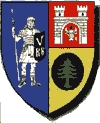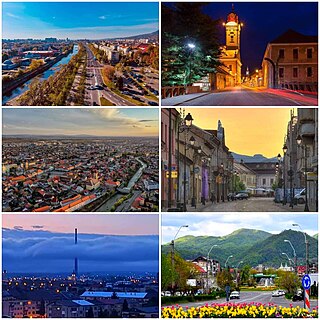
Baia Mare is a municipality along the Săsar River, in northwestern Romania; it is the capital of Maramureș County. The city lies in the region of Maramureș, a subregion of Transylvania. It is situated about 600 km (373 mi) from Bucharest, 70 km (43 mi) from the border with Hungary, and 50 km (31 mi) from the border with Ukraine.

Rožňava is a town in Slovakia, approximately 71 kilometres by road from Košice in the Košice Region, and has a population of 19,182.

Cugir is a town in Alba County, Romania. Declared a town in 1968, it administers seven villages: Bocșitura, Bucuru (Bukuruhavas/Bukur), Călene (Kalenihavas/Kalleney), Fețeni (Fecehavas/Fetzeberg), Goașele (Goaselehavas/Eisenhammer), Mugești (Mugestihavas/Kudschirstallen), and Vinerea (Felkenyér/Oberbrodsdorf).

Bălan is a town in Harghita County, Transylvania, Romania. It has historically been one of Transylvania and Romania's most important centers for copper mining, but its mines are no longer operational. Its Romanian name means "blond", the German name means "copper mine" while the Hungarian name means "Balán mine".

Vidra is a commune, located in Alba County, Transylvania, Romania. It is the commune with the second highest number of villages (39) in Romania. These are: Băi, Bobărești, Bogdănești, Bordeștii Poieni, Culdești, Dealu Goiești, Dos, Dosu Luncii, Dosu Văsești, Drăgoiești-Luncă, Ficărești, Gligorești, Goiești, Haiducești, Hărăști, Hoancă, Jeflești, Lunca, Lunca Bisericii, Lunca de Jos, Lunca Goiești, Lunca Vesești, Modolești, Nemeși, Oidești, Pitărcești, Pleșcuța, Poieni, Ponorel (Aranyosponor), Puiulețești, Runc, Segaj, Urdeș, Vâlcăneasa, Vâlcești, Valea Morii, Vârtănești, Văsești and Vidra. It also included Vidra de Sus and other villages until 1924, when they were split off to form Avram Iancu Commune.

The Arieș is a left tributary of the river Mureș in Transylvania, Romania. It discharges into the Mureș in Gura Arieșului, 11 km (6.8 mi) southwest of Luduș. Its total length is 166 km (103 mi), and its drainage basin area is 3,005 km2 (1,160 sq mi).

Brad is a city in Hunedoara County in the Transylvania region of Romania. Its name comes from the Romanian word brad, "fir".
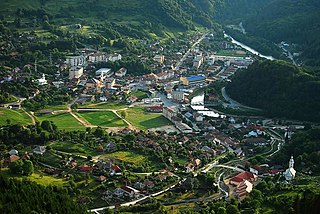
Baia de Arieș is a town in Alba County, Romania. It administers five villages: Brăzești (Berzesd), Cioara de Sus (Felsőcsóra), Muncelu (Muncsal), Sartăș (Szártos), and Simulești. With a population of 3,035 in 2021, it was until 2004 a mining centre extracting, mainly for base metals but also arsenopyrite and pyrite-rich concentrate containing gold.

Câmpeni is a town in Alba County, Transylvania, Romania. The town administers 21 villages: Boncești, Borlești, Botești (Botesbánya), Certege (Csertés), Coasta Vâscului, Dănduț, Dealu Bistrii, Dealu Capsei, Dric, Fața Abrudului, Florești, Furduiești, Mihoești, Motorăști, Peste Valea Bistrii, Poduri, Sorlița, Tomușești, Valea Bistrii, Valea Caselor, and Vârși (Virs).

Roșia Montană is a commune of Alba County in the Apuseni Mountains of western Transylvania, Romania. It is located in the Valea Roșiei, through which the small river Roșia Montană flows. The commune is composed of sixteen villages: Bălmoșești, Blidești, Bunta, Cărpiniș (Abrudkerpenyes), Coasta Henții, Corna (Szarvaspatak), Curături, Dăroaia, Gârda-Bărbulești, Gura Roșiei (Verespataktorka), Iacobești, Ignățești, Roșia Montană, Șoal, Țarina, and Vârtop (Vartop).
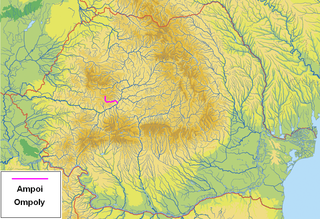
The Ampoi is a river in the Apuseni Mountains, Alba County, western Romania. It is a right tributary of the river Mureș. It flows through the town Zlatna, and joins the Mureș near Alba Iulia. Its length is 43 km (27 mi) and its basin size is 250 km2 (97 sq mi).

Blandiana is a commune located in Alba County, Transylvania, Romania. It has a population of 818 and is composed of five villages: Acmariu (Akmár), Blandiana, Ibru, Poieni, and Răcătău (Rakató).

Bucium is a commune located in Alba County, Transylvania, Romania. It has a population of 1,272 as of 2021. It is composed of thirty villages: Anghelești, Bisericani, Bucium, Bucium-Sat (Bucsum-Szát), Cerbu (Bucsum-Cserbu), Ciuculești, Coleșeni, Dogărești, Ferești, Florești, Gura Izbitei, Helești, Izbicioara, Izbita (Bucsum-Izbita), Jurcuiești, Lupulești, Măgura, Muntari (Bucsum-Muntár), Petreni, Poiana, Poieni (Bucsum-Pojén), Stâlnișoara, Vâlcea, Valea Abruzel, Valea Albă, Valea Cerbului, Valea Negrilesii, Valea Poienii, Valea Șesii, and Văleni.

Întregalde is a commune located in Alba County, Transylvania, Romania. It is composed of eleven villages: Dealu Geoagiului (Havasgyógy), Ghioncani, Iliești, Întregalde, Ivăniș, Mărinești, Modolești, Necrilești (Nekrilesti), Popești (Popesti), Sfârcea (Szfirecsea) and Tecșești (Teksesty).
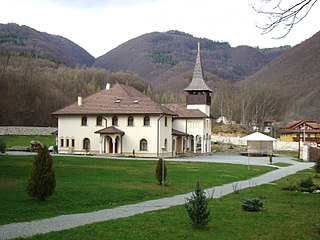
Lupșa is a commune located in Alba County, Transylvania, Romania. It is composed of 23 villages: Bârdești, Bârzan, Curmătură, După Deal, Geamăna, Hădărău, Holobani, Lazuri, Lunca, Lupșa, Mănăstire, Mărgaia, Mușca, Pârâu-Cărbunări, Pițiga, Poșogani, Șasa, Trifești, Văi, Valea Holhorii, Valea Lupșii, Valea Șesii, and Vința.

Mogoș is a commune located in Alba County, Transylvania, Romania. It has a population of 647 as of 2021. It is composed of 21 villages: Bărbești, Bârlești (Mogosbirlesty), Bârlești-Cătun, Bârzogani, Bocești, Bogdănești, Butești, Cojocani (Mogoskozsokány), Cristești, Mămăligani (Mamaligány), Mogoș, Negrești, Oncești, Poienile-Mogoș, Tomești, Valea Bârluțești, Valea Barnii (Valeabarni), Valea Cocești, Valea Giogești (Gyogyel), Valea Mlacii, and Valea Țupilor.

Râmeț is a commune located in Alba County, Transylvania, Romania. It is composed of thirteen villages: Boțani, Brădești (Fenyősremete), Cheia (Remeteiszoros), Cotorăști, Florești, Olteni (Szabaderdő), Râmeț, Valea Făgetului, Valea Inzelului, Valea Mănăstirii (Remetekolostor), Valea Poienii, Valea Uzei and Vlădești.

Rimetea is a commune located in Alba County, Transylvania, Romania. It is composed of two villages, Colțești and Rimetea. A former mining town, today it is known as the location of the Piatra Secuiului mountain.

Sălciua is a commune located in Alba County, Transylvania, Romania. It is composed of six villages: Dealu Caselor (Hegyik), Dumești, Sălciua de Jos, Sălciua de Sus (Felsőszolcsva), Sub Piatră (Búvópatak), and Valea Largă (Malompataka). It has a population of 1,271 as of 2021.

Alba County is a county (județ) of Romania located in the historic region of Transylvania. Its capital is Alba Iulia, a city with a population of 63,536.




























